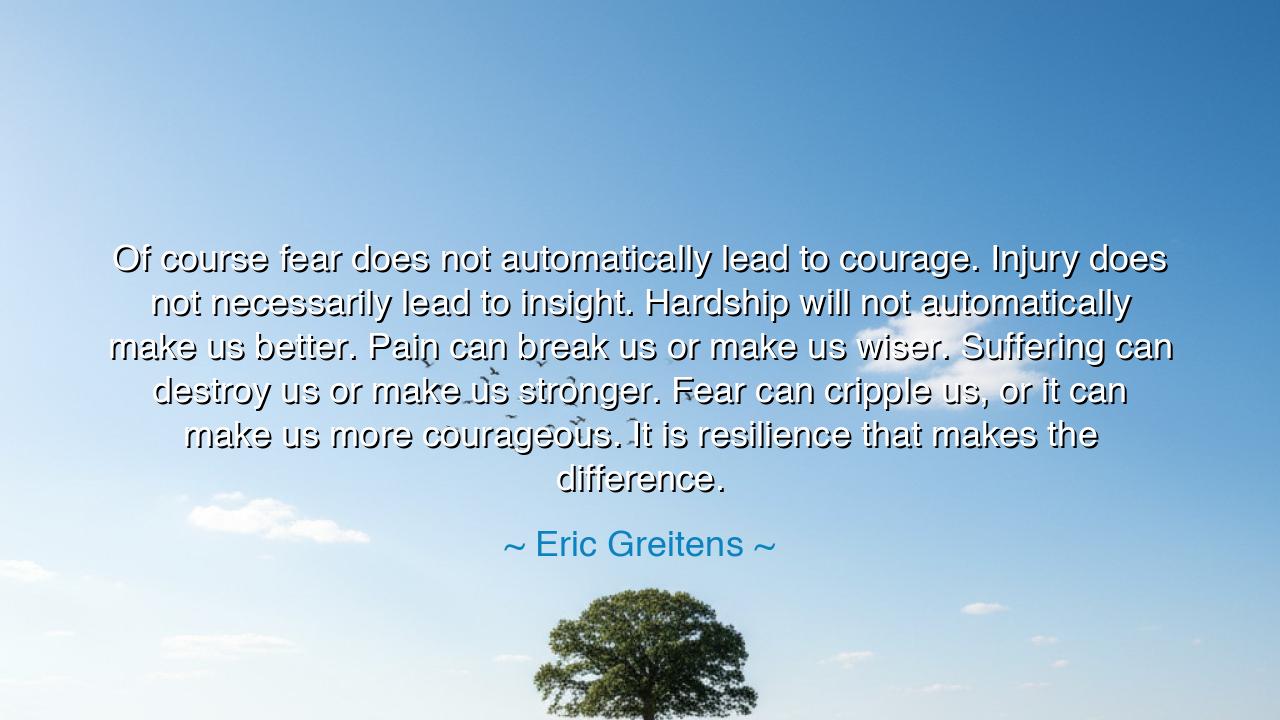
Of course fear does not automatically lead to courage. Injury
Of course fear does not automatically lead to courage. Injury does not necessarily lead to insight. Hardship will not automatically make us better. Pain can break us or make us wiser. Suffering can destroy us or make us stronger. Fear can cripple us, or it can make us more courageous. It is resilience that makes the difference.






When Eric Greitens, a former Navy SEAL and humanitarian, declared, “Of course fear does not automatically lead to courage. Injury does not necessarily lead to insight. Hardship will not automatically make us better. Pain can break us or make us wiser. Suffering can destroy us or make us stronger. Fear can cripple us, or it can make us more courageous. It is resilience that makes the difference,” he was speaking from the battlefield of both body and spirit. His words carry the weight of experience — not theory, but truth forged in the crucible of struggle. What he teaches is as old as the human heart: that adversity itself does not sanctify; it is the response that transforms it. Resilience — that quiet, stubborn strength of the soul — is what turns despair into discipline, pain into purpose, and fear into fire.
The ancients knew this truth well. They, too, faced storms that tested the spirit — wars, plagues, exile, and loss — yet they understood that suffering is neither good nor evil in itself; it is the forge in which character is tempered. The philosopher Seneca, who lived under the shadow of imperial tyranny, wrote, “Fire tests gold, suffering tests brave men.” But he also warned that fire can consume as easily as it purifies. The same flame that hardens steel will melt wax. So it is with the human soul: hardship reveals what we are made of. It can burn away weakness or engulf us entirely. What determines the outcome is resilience — the power to rise, to adapt, to endure without surrendering the light within.
Greitens’ insight was born not from comfort, but from chaos. As a soldier and a servant to those broken by war, he witnessed the two faces of pain: one that destroys and one that awakens. Some men returned from the battlefield haunted, broken beyond repair; others, though scarred, became sources of compassion, leadership, and strength. The difference was not in what they suffered, but in how they met that suffering. The resilient heart refuses to be defined by pain; it wrestles with it, learns from it, and transforms it into wisdom. Just as the oak grows stronger in the storm, so too does the spirit grow in adversity — but only if it bends without breaking.
This teaching finds echoes across history. Consider the life of Nelson Mandela, who endured twenty-seven years of imprisonment. His chains could have turned him bitter, his solitude into madness. Yet, he emerged not as a broken man, but as a moral giant, preaching forgiveness to those who had oppressed him. What preserved him was not the absence of suffering, but resilience — the unyielding belief that purpose is greater than pain. He once said, “Do not judge me by my success, judge me by how many times I fell and got back up again.” This is the living embodiment of Greitens’ wisdom: that the trials of life are not the final word; the will to rise is.
Fear, injury, hardship, suffering — these are the universal teachers of the human race, but they are harsh instructors. They offer lessons only to those willing to learn. Fear can either paralyze or sharpen; pain can either embitter or enlighten. What transforms suffering into strength is the ability to persevere through it — to face it with open eyes and steady heart. This is what the Stoics called fortitude, what the Buddhists called equanimity, what warriors have called grit. In every culture, the essence is the same: resilience is the bridge between suffering and strength, between fear and courage, between survival and growth.
There is a kind of sacred defiance in resilience — a refusal to let darkness have the last word. It is not denial, nor the illusion of invincibility. True resilience acknowledges pain, but it refuses to worship it. It says: Yes, I am wounded, but I am not finished. Yes, I am afraid, but I will still move forward. It is the soul’s quiet rebellion against despair. It does not wait for life to be easy; it learns to endure the hard. And in enduring, it discovers an inner power that no external force can break. The resilient heart, once awakened, becomes unconquerable.
So, my listener, take this teaching into your own life: do not expect hardship to transform you automatically — let your response to it be your transformation. When fear arises, do not curse it; face it and move through it. When pain visits you, do not flee; listen to what it teaches. When life strikes you down, do not lie broken; gather your strength and rise again. For it is not the wound that defines you, but how you heal. Resilience is the alchemy of the human spirit — the power to turn suffering into wisdom, fear into courage, and loss into love.
And remember always the lesson of Eric Greitens: that pain will come to all, but victory belongs only to the resilient. For while fear trembles and strength fades, resilience endures. It is the immortal flame of the soul — and through it, the human spirit rises, again and again, beyond all that would destroy it.






AAdministratorAdministrator
Welcome, honored guests. Please leave a comment, we will respond soon